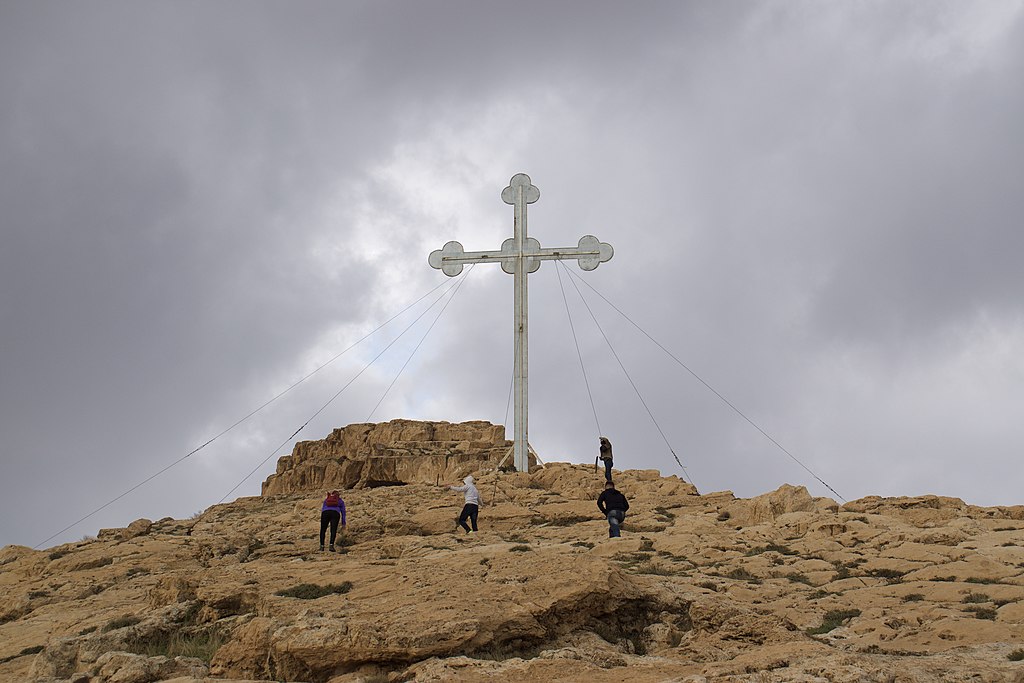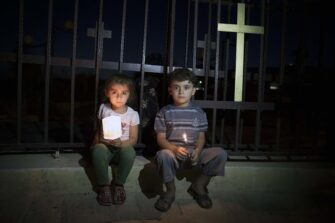
Since the mid-nineteenth century, narratives of Christian persecution have exerted a gravitational pull on western writings on Middle Eastern Christianity. Whether in the vulgar idiom of the commonplace ahistorical narratives of the persecution of a beleaguered Christian minority at the hands of an undifferentiated Muslim majority, or in more subtle renditions, western narrations of Middle Eastern Christianity often invoke persecution as a quasi-defining category. Departing from this implied orthodoxy, Mitri Raheb’s The Politics of Persecution: Middle Eastern Christians in an Age of Empire promises and delivers “an alternative interpretation of the history of Middle Eastern Christianity” (3).
Central to Raheb’s erudite study is his demonstration that this persecution discourse is “a Western construct that says more about the West than about the Christians of the Middle East” (143). As the author explains, “Intra-European national rivalries and competition in religious mission… planted the seeds for sectarian identities that were not previously known in such a form or intensity” (31). The ensuing “culture of sectarianism” precipitated the disintegration of the very social fabric of the Middle East and in turn, served as the hotbed for the successive catastrophic events that beset Middle Eastern Christians—which the author discusses in detail throughout the book. As Raheb concludes,
Over and over again, Middle Eastern Christians were sacrificed at the altar of Western national interests. This was the case with Britain and the Assyrians in Iraq; with Germany in the Armenian Genocide; with Britain in Palestine; and with the United States in Iraq and Syria. In most cases, the West was part of the problem for Middle Eastern Christianity and not part of the solution (150).
Not only does the persecution discourse lack the tools necessary to scrutinize the roots of the problem—the very subject it sets out to elucidate—but it also doggedly effaces western complicity in the Middle Eastern Christian predicament.
Raheb, however, does more than offer a careful anatomy of the sectarian ails of Middle Eastern society and their origins. It is said, in theological parlance, that naming the sin is a theological achievement—one, as Stanley Hauerwas indicates, that is “made possible by being part of a people who are pledged to love one another even if it requires telling one another the truth.” By reorienting our vision from facile, ill-founded, and misleading Muslim-Christian “battling to the end” narratives, the author invites his audience to name the sin necessary to metanoia, the fundamental transformation necessary for intra- and inter-communal reconciliation. At its heart, The Politics of Persecution is a book about hope—the hope for reconciling the brokenness of the Middle Eastern bodies torn apart by the violent culture of sectarianism, which as Raheb demonstrates, is planted and cultivated by imperial interests, and cloaked by the persecution discourse.
In his highly acclaimed Frankenstein in Baghdad, Ahmed Saadawi conjures up the unspeakable horrors of war-torn Iraq in the figure of Frankenstein’s monster, who is “made up of body parts of people from diverse backgrounds—ethnicities, tribes, races, and social classes” (152). Set on a relentless quest to avenge the deaths and mutilations of his former body parts’ owners, the monster personifies the desperate cry for justice amid ineffable injustice. Saadawi’s macabre and brutal surreal presentation of the broken bodies sewn together to produce this avenging monstrous mishmash is an apt manifestation of a dismembered body politic that was plagued with senseless violence. Refusing to succumb to the foredoomed fate of this Baghdadi monster, Raheb’s alternative prophetic interruption is a call for repentance and reconciliation.
In many ways, Raheb’s discernible offering of hope evokes that of Emmanuel Katongole in his Mirror to the Church, in which the author reflects on the theological implications of the Rwandan genocide:
I want to suggest that the crisis of Western Christianity is reflected back to the church in the broken bodies of Rwanda. Western Christians cannot look into this mirror without coming face-to-face with betrayal, idolatry, and death. Indeed, I want to say the only hope for our world after Rwanda’s genocide is a new kind of Christian identity for the global body of Christ. (13)
Throughout the different chapters of his study, Raheb similarly suggests that the crisis of Western and Eastern Christianity is reflected back to the church in the broken bodies of Middle Eastern Christians. Like Mirror to the Church, The Politics of Persecution supplants the stories that perpetuate brokenness and ultimately genocide with healing ones. Interrogating and destabilizing the persecution discourse is an indispensable step in this process.

Raheb’s reconciliatory and hopeful vision permeates even the darkest episodes in the book. Indeed, the different chapters lead the reader on a journey that explores different historic events through the eyes of a motley crew of Middle Eastern Christian actors, from Asʿad Shidyaq, one of the first Arabic-speaking converts to Protestantism and the first Arab Protestant martyr (25-27), to agents of Arab and ecclesiastical revival such as Yacoub Sarrouf, Jurji Zeidan (50), Negib Azoury (66), and Bishop George Khodr (80)—all the way to the contemporary Christian Academic Forum for Citizenship in the Arab World (Chapter 12). The author’s presentation of Butrus al-Bustani (1819–1883), the towering Arab Christian intellectual, and the first Middle Eastern Christian voice encountered in the study, is a powerful case in point. Hailing from present-day Lebanon, Bustani was an ardent proponent of the Arab Renaissance (al-Nahda) and played a key role in translating the Bible into Arabic (the very translation that many Arabic-speaking Christians still use to this day). In response to the massacre of Christians on Mount Lebanon, Bustani founded al-Madrasa al-Wataniya (the National School) “where in an ecumenical spirit, Christians, Druze, and Muslims could study together”—an experiment that, as Raheb notes, “must be understood as a critique of the many missionary schools that Bustani came to know and sometimes teach in” (45). Bustani’s experiment thus serves “as an antidote to confessional fanaticism, and thus to sectarianism” (44): the very sectarianism that fueled the massacre. Interwoven throughout the study, the different testimonies of these diverse Arab Christian figures converge on their unremitting attempt to achieve peaceful and harmonious living with their compatriots, regardless of their communal belonging.
The stark contradiction can hardly be missed: whereas colonial interests and narratives continue to fuel sectarianism and to perpetuate the discourse of Christian persecution, the stories of Middle Eastern Christian resistance and resilience offer powerful counternarratives of healing and reconciliation. By centering Middle Eastern Christian voices throughout the study, Raheb potently deploys a decolonial reframing and re-envisioning of interfaith relations in the region. Narrated through their eyes, the story of Middle Eastern Christians is not so much one of persecution but of “struggle, resistance, social involvement, and resilience” (156).
Not only does The Politics of Persecution present a much-needed decolonial interruption, but it also affirms the necessity of repentance and reconciliation in ensuring a peaceful and just future: it is an offering of hope grounded in the lived experience of Middle Eastern Christians. After all, as Raheb establishes throughout his investigation, the story of Middle Eastern Christians is the story of the Middle East.

